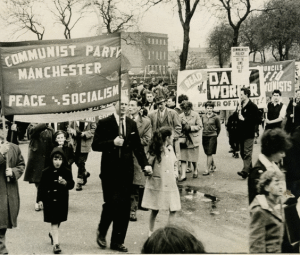 |
| CND Demo |
According to one blog (click on CND picture for whole article)
'The CND emerged from a set of historic developments, which cumulatively worried many British people. One of these key events was the mass publication of America’s official photographs of an earlier thermonuclear test in spring 1954. Several newspapers reverted to religious language to describe the bomb. The Daily Mirror’s star columnist, William Connor, adopted an apocalyptic tone in his ‘Cassandra’ column. He wrote:
WELCOME, Dear Bomb. Welcome and bless you.
Bless those who made you. Bless those who set you roaring and flaming and vaporising the face of the earth.
Bless the hellish heat of you. Bless the bursting heart of you (29 March 1954: 7).
 Since then, I've grown up, had my family, and these concerns seem to have gone away into the background, no longer part of the current Zeitgeist. And it was only when I picked up 'Red Joan' by Jennie Rooney and began reading that I was taken back to those days. Red Joan is a fantastic book, taking as its central premise the idea that a woman who has access to the secret of the making of the atom bomb might be pressurised to reveal that information, and how her allegiances might shift as political events unfold through her life.
Since then, I've grown up, had my family, and these concerns seem to have gone away into the background, no longer part of the current Zeitgeist. And it was only when I picked up 'Red Joan' by Jennie Rooney and began reading that I was taken back to those days. Red Joan is a fantastic book, taking as its central premise the idea that a woman who has access to the secret of the making of the atom bomb might be pressurised to reveal that information, and how her allegiances might shift as political events unfold through her life.
Red Joan is loosely based on the real life spy Melita Norwood, who was only rumbled once she reached the ripe old age of 87 years, Red Joan takes us from the 1930's at Cambridge university to the later years of Joan's life, by which time she is living a perfectly ordinary suburban existance in Sidcup in Kent.
In an interview with the Telegraph, in which you can read more, Mrs Norwood said:
"I did what I did not to make money," she told me, "but to help prevent the defeat of a new system [Communism] which had, at great cost, given ordinary people food and fares which they could afford, a good education and health service. I thought that perhaps some of what I had access to might be useful in helping Russia to keep abreast of Britain, America and Germany."
'The CND emerged from a set of historic developments, which cumulatively worried many British people. One of these key events was the mass publication of America’s official photographs of an earlier thermonuclear test in spring 1954. Several newspapers reverted to religious language to describe the bomb. The Daily Mirror’s star columnist, William Connor, adopted an apocalyptic tone in his ‘Cassandra’ column. He wrote:
WELCOME, Dear Bomb. Welcome and bless you.
Bless those who made you. Bless those who set you roaring and flaming and vaporising the face of the earth.
Bless the hellish heat of you. Bless the bursting heart of you (29 March 1954: 7).
 |
| Australian women marching in 1954 |
Red Joan is loosely based on the real life spy Melita Norwood, who was only rumbled once she reached the ripe old age of 87 years, Red Joan takes us from the 1930's at Cambridge university to the later years of Joan's life, by which time she is living a perfectly ordinary suburban existance in Sidcup in Kent.
 |
| Melita Norwood |
"I did what I did not to make money," she told me, "but to help prevent the defeat of a new system [Communism] which had, at great cost, given ordinary people food and fares which they could afford, a good education and health service. I thought that perhaps some of what I had access to might be useful in helping Russia to keep abreast of Britain, America and Germany."
Very rarely do we consider what might motivate a person who sells our secrets to a foreign power, but this book conveys it brilliantly - all the grey areas, the atmosphere of fear, the personal and romantic relationships that exercise an inexorable pull on our choices. And very rarely do we consider that a spy might be ulimately altruistically motivated.
For those of you that remember this era, and those who do not, I heartily recommend this gripping and insightful book.
No comments:
Post a Comment